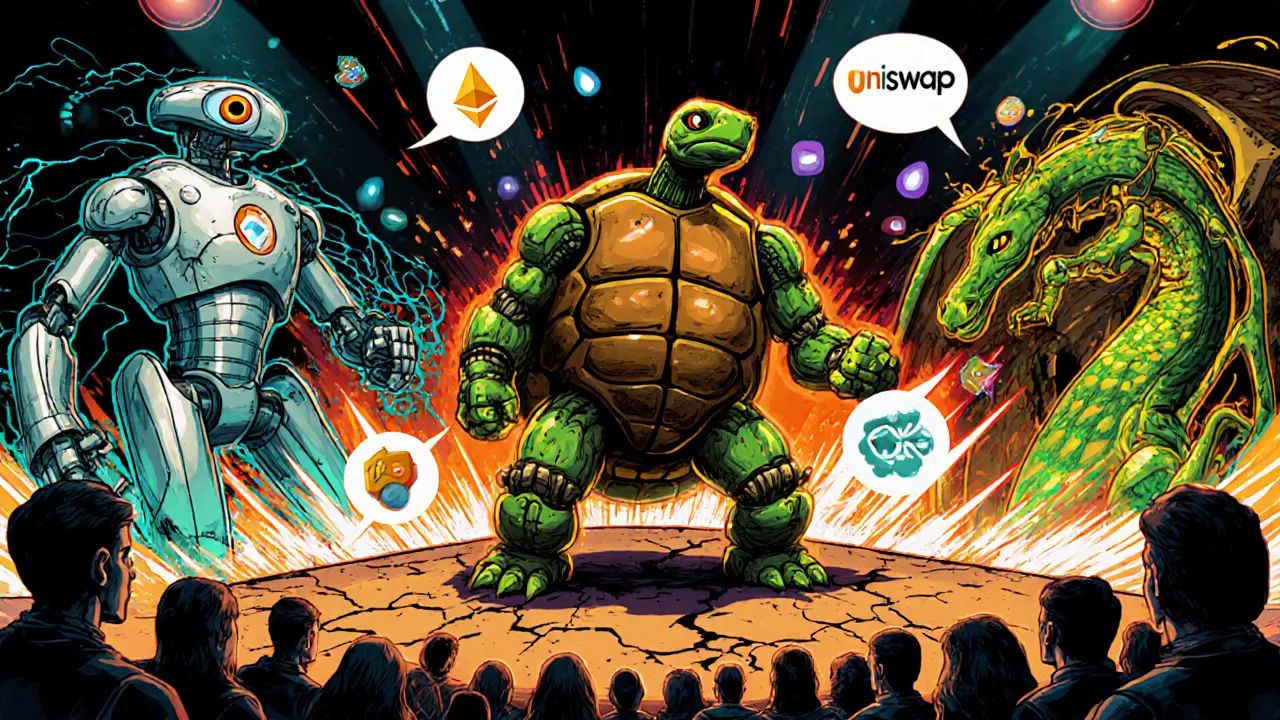Turtle Network DEX Risk Assessment Tool
Platform Comparison Overview
| Criteria | Turtle Network DEX | Top DEXs (Uniswap, PancakeSwap, Curve) |
|---|---|---|
| Security Audits | None published | Regularly audited by third parties |
| Volume Transparency | Claimed ~$161.5B (unverified) | Verified by independent sources |
| Liquidity | Not disclosed | High, well-documented |
| Community Support | Minimal presence | Active communities |
| Wallet Compatibility | Unclear | Wide range of supported wallets |
| Development Activity | No recent updates | Active development |
Risk Factors Evaluation
Risk Assessment Result
Quick takeaways
- Turtle Network DEX claims huge 24‑hour volume, but independent data is scarce.
- It runs on the Turtle Network blockchain, a fork of Waves, and appears to use a basic AMM model.
- Major DEXs like Uniswap, PancakeSwap and Curve dwarf it in liquidity, community and audit transparency.
- No public security audits or bug‑bounty programs are listed, raising safety questions.
- For most traders, established DEXs remain the safer, more feature‑rich options.
What is Turtle Network DEX?
When you hear the name Turtle Network DEX, think of a niche decentralized exchange that launched in April 2018 and is registered in Belgium. Turtle Network DEX is a decentralized exchange built on the Turtle Network blockchain. The platform markets itself as a peer‑to‑peer trading venue without a central order book, relying on smart contracts to match swaps automatically.
The broader ecosystem, Turtle Network blockchain is a fork of the Waves protocol that supports custom assets and smart contracts, powers the exchange. While the blockchain itself is functional, the DEX portion lacks the public visibility that more popular platforms enjoy.
Technical architecture and core features
Exact implementation details are thin, but industry patterns give us clues. Most DEXs built on Waves‑derived chains employ an automated market maker (AMM) model similar to Uniswap. That means liquidity providers deposit token pairs into a pool, and traders receive quotes based on the constant‑product formula (x*y=k). The Turtle Network DEX likely follows the same route, offering:
- Token swapping with on‑chain settlement.
- Liquidity provision for any ERC‑20‑compatible asset issued on the Turtle Network.
- Peer‑to‑peer trades without intermediaries.
Unlike Uniswap, PancakeSwap or Curve, the platform does not publicly advertise specialized features-such as stablecoin‑focused low‑fee pools, multi‑chain routing, or leveraged derivatives.
Market position and how it stacks up against the heavyweights
To understand where Turtle Network DEX fits, we can compare a few headline metrics that matter to traders. The numbers below pull from publicly available sources (CoinMarketCap for the Turtle Network claim, Dune Analytics for Uniswap, etc.).
| Exchange | Launch Year | TVL (USD) | 24h Volume (USD) | Supported Chains | Notable Feature |
|---|---|---|---|---|---|
| Turtle Network DEX | 2018 | Data not disclosed | ~$161.5B (claimed) | Turtle Network only | Basic AMM on a Waves‑fork chain |
| Uniswap | 2018 | $4.2B | $1.1B | Ethereum, Polygon, Optimism, Arbitrum | Largest ETH‑based AMM, extensive token list |
| PancakeSwap | 2020 | $2.1B | $620M | BNB Smart Chain, Arbitrum, Polygon | Low fees, yield farms, lottery |
| Curve | 2020 | $4.0B | $920M | Ethereum, Optimism, Polygon | Stablecoin‑centric low‑slippage pools |
The table highlights a stark reality: Turtle Network DEX does not appear in any TVL rankings, and its claimed daily volume is anomalously high compared to the rest of the ecosystem. Without third‑party verification, that figure should be taken with caution.

Security, audits and safety considerations
Security is non‑negotiable for any DeFi platform. Established DEXs publish audit reports from firms like Trail of Bits, Quantstamp, or CertiK. Security audit is an independent code review that verifies smart‑contract safety for Uniswap, PancakeSwap and Curve, and they also run bug‑bounty programs.
For Turtle Network DEX, there are no publicly available audit documents, no bug‑bounty listings, and the GitHub repository is either private or inactive. This lack of transparency raises red flags. In the DeFi space, unaudited contracts have historically led to exploits that wiped out millions of dollars.
User experience, wallet support and community engagement
Trader comfort hinges on easy wallet integration and responsive community channels. Platforms like Uniswap integrate MetaMask, WalletConnect, Ledger, and others out of the box. Their Discord and Telegram communities host thousands of active members, providing real‑time support.
Attempts to locate Turtle Network DEX on popular wallet interfaces turn up empty. The official site does not list supported wallets, nor does it provide a step‑by‑step onboarding guide. A quick search on Reddit, Bitcointalk, and major crypto forums yields almost no threads mentioning personal experiences, swaps, or liquidity provision. This vacuum suggests either a very small user base or a platform that has not invested in community building.
Development activity and roadmap outlook
Active development signals a project's health. Uniswap’s GitHub sees weekly commits, new feature releases, and regular security patches. PancakeSwap and Curve similarly keep their repositories bustling.
In contrast, the Turtle Network DEX’s codebase cannot be found under a public GitHub or GitLab organization. No roadmap, milestone announcements, or developer blogs have surfaced since the 2020‑2021 window. Without visible progress, potential users cannot gauge whether the platform will adapt to emerging trends like layer‑2 scaling, cross‑chain swaps, or regulatory compliance.
Bottom line - Should you trade on Turtle Network DEX?
Based on the evidence, Turtle Network DEX sits on the periphery of the decentralized exchange market. Its claimed volume is uncorroborated, core features are generic, security documentation is absent, and community signals are minimal. For casual traders or anyone handling significant capital, the risk‑reward balance leans heavily toward established DEXs that offer:
- Verified smart‑contract audits.
- Transparent liquidity metrics.
- Broad wallet compatibility.
- Active developer pipelines.
- Vibrant user communities.
If you’re experimenting with a tiny amount of funds and are comfortable navigating an undocumented interface, you could give Turtle Network DEX a test run. Otherwise, stick with platforms that have proven track records.
Frequently Asked Questions
Is Turtle Network DEX safe to use?
Safety cannot be guaranteed because the platform does not publish any third‑party security audits or bug‑bounty programs. Users should treat it as high‑risk and only allocate funds they can afford to lose.
What wallets can I connect to Turtle Network DEX?
Official documentation does not list supported wallets. In practice, only wallets that can interact directly with the Turtle Network blockchain (native Turtle wallet or generic Web3 providers) may work, but no mainstream wallets like MetaMask are confirmed.
How does the reported $161.5B daily volume compare to other DEXs?
The figure is unusually large and not reflected in independent data aggregators. For reference, Uniswap’s 24‑hour volume hovers around $1B, PancakeSwap around $600M, and Curve near $900M. Until verified, the claim should be treated skeptically.
Does Turtle Network DEX offer any unique features?
Public information only mentions a basic AMM model. There are no disclosed features like low‑fee stablecoin pools, cross‑chain routing, or built‑in yield farms that set it apart from better‑known DEXs.
Where can I find the roadmap for future development?
No public roadmap exists. The team has not released updates on GitHub, Medium, or any social channel in the past year, making future plans unclear.


Prabhleen Bhatti
October 3, 2025 AT 23:32Joseph Eckelkamp
October 4, 2025 AT 11:29Elizabeth Mitchell
October 5, 2025 AT 06:33Dimitri Breiner
October 5, 2025 AT 17:19Rohit Sreenath
October 6, 2025 AT 04:48John E Owren
October 6, 2025 AT 04:50Chris Houser
October 6, 2025 AT 13:20LeAnn Dolly-Powell
October 7, 2025 AT 09:27Jennifer Rosada
October 7, 2025 AT 15:01William Burns
October 8, 2025 AT 03:00Ashley Cecil
October 8, 2025 AT 09:01adam pop
October 8, 2025 AT 19:05Richard Williams
October 9, 2025 AT 01:31Joseph Eckelkamp
October 9, 2025 AT 05:09